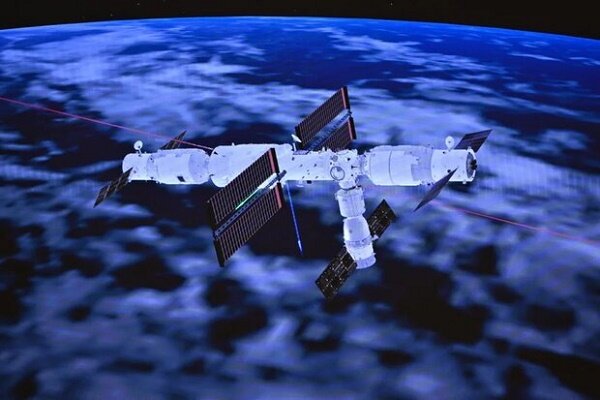SEX IN SPACE

The research would be conducted in the space station’s largest module slated to be used for life science experiments, South China Morning Post reported, citing Zhang Lu, a scientist leading the development of scientific equipment for the space station, according to Independent.
“These experiments will help improve our understanding of an organism’s adaptation to microgravity and other space environments,” Dr. Lu, a researcher at the Chinese Academy of Sciences in Beijing, said in a speech.
China completes T-shaped Tiangong space station with new Mengtian module move
The country's three Shenzhou 14 astronauts have entered the latest addition to their space station home.
The basic construction of China's space station is complete, following a maneuver to shift the recently arrived Mengtian module to its permanent docking port.
China launched Mengtian, the third and final module for its Tiangong space station, on Oct. 31. Mengtian, which means "dreaming of the heavens," docked at a forward port at Tiangong 13 hours later.
The Mengtian module was then moved from that forward port on Tiangong to a portside berth on the station's docking hub. The process involved a 90-degree turn of the module and was completed at 0132 GMT (9:32 a.m. Beijing time) on Thursday (Nov. 3) using a purpose-made powered mechanical device.
China's new Mengtian module for the Tiangong space station is moved into its final position on the T-shaped orbiting laboratory. (Image credit: China Manned Space Engineering)
A similar procedure was conducted with the Wentian module in late September, moving the module to Tiangong's starboard docking port.
This means the China National Space Administration has now completed the construction of its T-shaped Tiangong orbital outpost, which consists of the Tianhe core module and Wentian and Mengtian experiment modules.
The country plans to operate Tiangong for at least years, during which time it aims to keep it permanently occupied and potentially host commercial missions to the station.
The current occupants — three astronauts belonging to the Shenzhou 14 crewed mission — entered Mengtian for the first time at 3:12 p.m. Beijing time (0712 GMT) Thursday, just hours after the transposition.
Watch China's Shenzhou-14 crew enter Mengtian lab in space for 1st time
Astronauts Chen Dong, Liu Yang and Cai Xuzhe talked to the ground control staff shortly after entering the 58.7-foot-long (17.9 meters) and roughly 48,500-pound (22 metric tons) module.
"Mengtian, Wentian and Tiangong. The dream has come true. Shenzhou-14 reports that the crew has successfully entered the Mengtian lab module," Chen said.
“China's space station is a home in the heavens for all humanity," Liu, who became China’s first woman in space in 2012, added.
The astronauts will now be involved in testing the systems of the completed Tiangong space station in its T-shape configuration.
With the space station completed, the Shenzhou 14 astronauts are expected to welcome aboard the next crew, Shenzhou 15, before the end of the year.
A Long March 7 rocket is currently being prepared at the coastal Wenchang spaceport to launch the Tianzhou 5 cargo spacecraft which will deliver supplies to support Shenzhou 15 for its six-month-long expedition, with launch currently expected around November 12 (GMT).
Shenzhou 15 will blast off atop a Long March 2F rocket from the Jiuquan Satellite Launch Center in the Gobi Desert at an undisclosed time after Tianzhou 5 arrives at Tiangong.
No comments:
Post a Comment